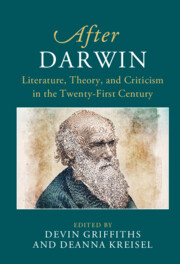Book contents
- After Darwin
- After Series
- After Darwin
- Copyright page
- Contents
- Figures
- Contributors
- Chapter 1 Introduction
- Part I Environments after Darwin
- Chapter 2 Darwin after Nature
- Chapter 3 Darwin and Animal Studies
- Chapter 4 Darwin’s Birdsong
- Chapter 5 Darwin and the Anthropocene
- Part II Differences after Darwin
- Part III Humanism after Darwin
- References
- Index
Chapter 2 - Darwin after Nature
Evolution in an Age of Extinction
from Part I - Environments after Darwin
Published online by Cambridge University Press: 01 December 2022
- After Darwin
- After Series
- After Darwin
- Copyright page
- Contents
- Figures
- Contributors
- Chapter 1 Introduction
- Part I Environments after Darwin
- Chapter 2 Darwin after Nature
- Chapter 3 Darwin and Animal Studies
- Chapter 4 Darwin’s Birdsong
- Chapter 5 Darwin and the Anthropocene
- Part II Differences after Darwin
- Part III Humanism after Darwin
- References
- Index
Summary
This chapter asks what it means to read Darwin in the middle of what appears to be the seventh mass extinction in Earth’s history, and the first caused by the actions of a single species, our own. Dipesh Chakrabarty argues that the Anthropocene marks the point at which “the wall between human and natural history has been breached,” thus mounting an unprecedented challenge to the foundations of humanism. However, one could make a similar claim for Darwin. On the Origin of Species arguably ruptured the divide between human and natural history by revealing that we are not, and never have been, fully separate from the web of life. Indeed, one might go so far as to say that the Anthropocene crisis has been brought about precisely by the failure to adequately internalize this central Darwinian insight. Reading Darwin in the Anthropocene means understanding both the degree to which our intellectual milieu is indebted to his work and the fact that his world was profoundly different from our own precisely because of the greater scope and power of what Carolyn Merchant calls “autonomous nature” within it. The historical distance separating us from Darwin marks not only a profound shift in the idea of nature, but in the ontological state of nature itself, which is to say the configuration of existing (and/or vanishing) species and ecosystems completely apart from our ideas of them. We need to reckon with both sides of that equation, and the relationship between them, if we are to understand Darwin’s relevance for our own efforts to forestall mass extinction in the present.
Keywords
- Type
- Chapter
- Information
- After DarwinLiterature, Theory, and Criticism in the Twenty-First Century, pp. 19 - 32Publisher: Cambridge University PressPrint publication year: 2022



